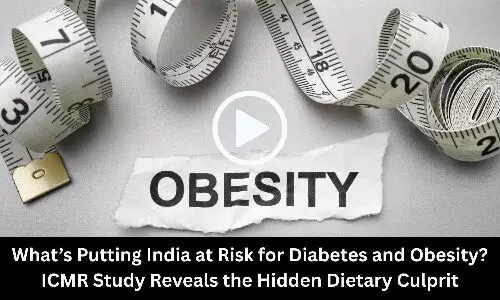What's Putting India at Risk for Diabetes and Obesity? ICMR Study Reveals the Hidden Dietary Culprit
- byDoctor News Daily Team
- 04 October, 2025
- 0 Comments
- 0 Mins

A new study by the Indian Council of Medical Research (ICMR), published in Nature Medicine, warns that India's high consumption of refined carbohydrates-mainly white rice and wheat- is significantly driving the country's escalating rates ofdiabetes,prediabetes, andobesity. The research, conducted under the ICMR-INDIAB project in collaboration with the Madras Diabetes Research Foundation (MDRF), analyzed the dietary habits of 1,21,077 adults from both urban and rural areas across 36 states. The cross-sectional survey revealed that carbohydrates make up a staggering 62% of Indians’ daily caloric intake—one of the highest rates globally. Much of this comes from low-quality sources such as white rice, milled grains, and added sugar. Regional dietary patterns further highlight the imbalance: while white rice dominates diets in the South, East, and Northeast, wheat is more common in the North and Central regions. Despite some regional diversity, the study found metabolic risks remained consistent across states, regardless of the primary carbohydrate source. “Replacing just 5% of daily calories from carbohydrates with plant or dairy proteins significantly lowers risk of developing diabetes and prediabetes,” said Dr V Mohan, senior author and Chairman of MDRF. He warned that “more than sugar, it is the rice and wheat which is eaten in excess and which are fuelling NCDs, especially diabetes.” Dr RM Anjana, lead author and President of MDRF, emphasized, “Simply switching from white rice to whole wheat or millets is not enough unless total carbohydrate intake decreases and more calories come from plant or dairy proteins.” Despite their known benefits, dairy and animal protein intakes remain low nationwide, and millets are staples in only three states: Karnataka, Gujarat, and Maharashtra. The authors call for urgent policy reforms targeting food subsidies and dietary guidelines to promote healthier, protein-rich foods and reduce saturated fats. Reference:Anjana, R.M., Sudha, V., Abirami, K. et al. Dietary profiles and associated metabolic risk factors in India from the ICMR–INDIAB survey-21. Nat Med (2025). https://doi.org/10.1038/s41591-025-03949-4
Disclaimer: This website is designed for healthcare professionals and serves solely for informational purposes.
The content provided should not be interpreted as medical advice, diagnosis, treatment recommendations, prescriptions, or endorsements of specific medical practices. It is not a replacement for professional medical consultation or the expertise of a licensed healthcare provider.
Given the ever-evolving nature of medical science, we strive to keep our information accurate and up to date. However, we do not guarantee the completeness or accuracy of the content.
If you come across any inconsistencies, please reach out to us at
admin@doctornewsdaily.com.
We do not support or endorse medical opinions, treatments, or recommendations that contradict the advice of qualified healthcare professionals.
By using this website, you agree to our
Terms of Use,
Privacy Policy, and
Advertisement Policy.
For further details, please review our
Full Disclaimer.
Recent News
Merck Keytruda wins European Commission nod for lo...
- 30 October, 2025
UP NEET 2025 round 3 allotment results postponed
- 30 October, 2025
Achin Gupta to succeed Umang Vohra as Cipla MD, GC...
- 30 October, 2025
Mumbai shocker: KEM Hospital doctor stabbed by col...
- 30 October, 2025
Daily Newsletter
Get all the top stories from Blogs to keep track.


0 Comments
Post a comment
No comments yet. Be the first to comment!